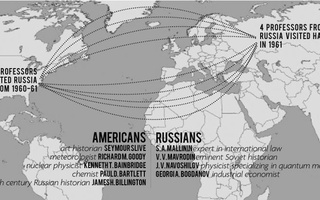President of Estonia Toomas H. Ilves discussed the relationships between the EU and NATO, and between Estonia and the Soviet Union yesterday at the Harvard Kennedy School.
Widely acclaimed for the political freedom and economic development made possible in Estonia under his leadership, Ilves drew a large Estonian audience, including an Estonian woman who was over ninety-years old and too weak to climb to the fourth floor of Littauer Building, and who waited downstairs for the President until the seminar ended.
The lecture segment of the event focused on the relationship between NATO and the EU.
The real problem, according to Ilyes, is that NATO and the EU do not talk to each other, and if the lack of formal and legal communication continues, Europe will see little progress in the near future.
In comparing NATO and the EU to the left and right sides of the brain, respectively, Ilves said that the two must communicate with each other in order to function normally.
In addition, Ilves discussed the tensions between Russia and Estonia.
In response to a question about why history textbooks in Estonia portray the relationship with the Soviet Union in a negative light, Ilves said he doesn’t “think there’s anything wrong with hating the Soviet Union.”
He then drew a distinction between the Soviet Union and Russia by paralleling the differences between the two nations to the differences between Nazi Germany and the Federal Republic of Germany.
But according to Marshall I. Goldman, Senior Scholar in the Davis Center for Russian and Eurasian Studies, the present history textbooks in Estonia may cause animosity against the Soviet Union amongst the younger generation.
Another audience member presented an alternative viewpoint.
“When I was in school we still had Soviet textbooks...which taught that Estonians were all being liberated,” said Andres Sevtsuk, an Estoniain MIT graduate student at the seminar, but “I do think that history should be taught factually, and I don’t think there ought to be a deliberate distortion.”
Read more in News
Galeria To Open Two New EateriesRecommended Articles
-
The ‘Wall’ in their Own WordsA generation of post-Soviet literary figures write essays and fiction on life in the Bloc
-
Illusions in the MotherlandAs the host of the 2014 Winter Olympics, Russia will find it difficult to close the door on the glimpse Vancouver has provided of a fake superpower with an ego problem.
-
Bezmozgis Offers Uninspired Take on Immigrant ExperienceFor a few decades in the middle of the last century, American fiction featured a strong Jewish voice, world-weary yet wisecracking, in which unconcern—even disgust—toward the world coexisted with fascination with its linguistic and philosophical possibilities. With his existential emphasis, the Jew became the everyman; though the Jewish immigrant now rarely appears as a novelistic protagonist, a great nostalgia for his brand of schmerz persists.
-
 Despite Tensions, Professors Cross Iron Curtain
Despite Tensions, Professors Cross Iron Curtain -
Mitt Romney’s RussiaRomney appears to cling to the implicit assumption that a post-Soviet Russia still poses the gravest danger to American interests.
-
Past Tense: Nabokov and Jakobson“Gentlemen, even if one allows that he is an important writer, are we next to invite an elephant to be Professor of Zoology?”













